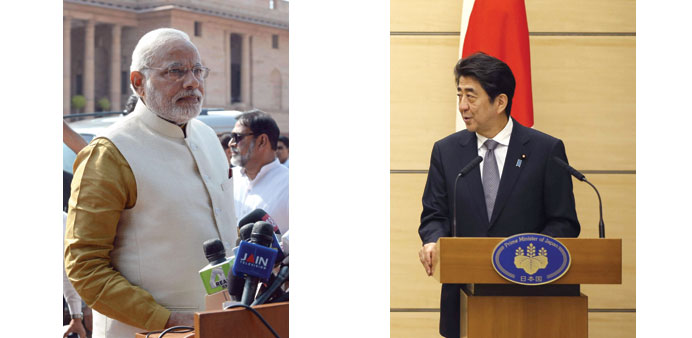By Arno Maierbrugger
Gulf Times Correspondent/Bangkok
|
|
Post-election India is set for a socio-economic change and a shift in its foreign relations. This becomes clear from the positions of prime minister-elect Narendra Modi, whose economic credentials were quickly likened to “Modinomics”, in reference to “Abenomics”, the economic reform programme Japan’s Prime Minister Shinzo Abe kicked off when he came to power in 2012.
“Modinomics” includes an ambitious approach to bring India’s economy back on its feet, open it wider to foreign investors, improve infrastructure, push innovation and talent development, reduce red tape - but on the fundamentals of soft nationalism and corporate conservativism.
When Modi was chief minister of Gujarat – the Indian state that is often presented at a role model for the success of “Modinomics” – he started forging ties to Japanese investors, visited Abe and was seemingly inspired by the latter’s economic directives for radical change in Japan.
It is highly likely that Modi’s first state visit will lead him straight to Tokyo, to build upon the good relations in the past, but also to push India’s Looking East policy that aims at partnerships with East and Southeast Asian countries other than China to dampen the rise of a Sino-centric Asia - this with the support from Washington.
As for economic relations, India and Japan are currently negotiating a civil nuclear accord that includes shipment of Japanese reactors to India, as well as infrastructure investments, including rapid train systems. The relationship could get much closer and literally open a new trade axis across South and East Asia.
These strengthening ties and deeper strategic relations hold a certain potential for GCC countries, which all not only have a large Indian diaspora, but also strong economic ties to the subcontinent. For example, both India and Japan import oil and natural gas, petrochemicals, fertiliser and other commodities from Qatar. The new axis could open promising trade routes and possible new co-operation between the GCC and Japan itself as the Asian economic landscape is expected to get significantly reshaped under a more intense Indo-Japanese partnership.
If Modi succeeds in kickstarting the Indian economy following the example set by Abe in Japan, then the country would not only wake up from its economic slumber, but also see a strong upswing in both foreign direct investment and the stock market. If “Modinomics” manage to bring the same renewed confidence as “Abenomics”, then India’s stock market can ready itself for a strong bounce – in Japan the anticipation of reforms had the stock market zoom by a whopping 80% in just six months with company valuations improving accordingly.
GCC enterprises which were wary of investing in India as long as it was in political and economic paralysis can certainly put the country back on their list of opportunities, and with the prospects of an open trade route to Japan, the opportunities seem to be tremendous. In fact, Indian-Japanese ties currently represent Asia’s fastest-developing bilateral relationship, dubbed by Abe himself as the one with the “greatest potential of any bilateral relationship anywhere in the world”.
As an important side effect, this includes safeguarding sea lanes in the wider Indo-Pacific region which are essential for regional trade and energy supply, in particular for oil and gas-exporting GCC countries.
Modi invites Sharif to swearing-in
Indian prime minister-elect Narendra Modi has invited Pakistan’s premier Nawaz Sharif to his swearing-in next Monday in a bold diplomatic statement that he intends to improve strained relations. A government official said in New Delhi yesterday that invitations to the ceremony had been sent to all heads of government from the South Asian Association for Regional Co-operation (Saarc) which includes Pakistan. “These communications have just gone off and we are now awaiting a response,” said foreign ministry spokesman Syed Akbaruddin. The invitation signals Modi’s intention to tackle India’s most troubled bilateral relationship at a time when Sharif is also keen on talks, analysts say. “It’s a very important gesture,” said Manoj Joshi, a fellow at the Observer Research Foundation, a New Delhi-based think-tank.

